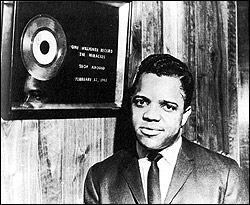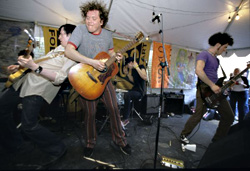In 1959, Berry Gordy’s teenage receptionist helped him co-write “Money (That’s What I Want).” Barrett Strong’s classic is often remembered as a key hint of Motown founder Gordy’s deepest motivation, but Janie Bradford’s involvement in the song’s authorship is also a reminder of the everybody-chip-in, let’s-put-on-a-show ethos of primordial Motown. There, a budding superstar like Marvin Gaye played drums and piano on other artists’ records (most famously, he provided the beat for the Marvelettes’ “Please Mr. Postman,” from 1961), while other acts similarly bided their time and Detroit high-schoolers made the offices their equivalent of an after-class malt shop.
The company’s first three years of 45-rpm output, lavishly packaged in the six-CD Complete Motown Singles, Vol. 1: 1959–1961 (Motown/Hip-O Select; a limited edition of 5,000 is available at www.hiposelect.com), chart the glories and missteps of an era when Gordy and his fellow upstarts just wanted to keep Hitsville’s cash flow going. (Hip-O Select plans 11 more volumes of the series, each devoted to a year’s output from 1962 to 1972.) A handful of trademark smashes—”Shop Around,” “Please Mr. Postman”—pepper this set, and Motown’s if-it’s-a-hit-do-it-again credo is already in place (see the Marvelettes’ marvelous sequel, “Twistin’ Postman”). But while this is clearly a professional operation, with most of the legendary Funk Brothers house band already on board, the assembly-line polish of the mid-’60s hasn’t fully arrived. Shortly to become the label’s biggest act, the Supremes in this period are failed again and again by lousy material, studio engineering that’s by turns murky and tinny, and a Diana Ross who hasn’t yet developed the purring style that would endear her to millions of teens and Ed Sullivan’s drinking-age viewers alike. At least one group beloved of aficionados, the Satintones, offers one depressingly ordinary track after another. And the word “apologize” is misspelled on the B-side label of Strong’s “Money.”
Given the world-beating success that was just around the corner, and the fact that Gordy later swore by weekly “quality control” meetings (at which producers unveiled new singles for the scrutiny of their fellows), the ramshackle nature of some of these tracks is striking unto hilarious. During these years, the Motown, Tamla, and short-lived Miracle imprints were stuck on lots of great R&B of varied stripes. Not just the expert Jackie Wilson imitations you’d expect—Gordy had co-authored Wilson smokers like “Lonely Teardrops” and “That’s Why” prior to the label’s founding—but crazed rockers by the Contours (the borderline-atonal “Whole Lotta Woman”) and the unsung Gino Parks, Sammy Ward’s mournful “What Makes You Love Him,” and the percolating genius of Smokey Robinson’s Miracles. The penultimate and finest single here, the Miracles’ “What’s So Good About Good Bye” backed with “I’ve Been Good to You,” plays like the most heartrending double shot ever.
But the secret historyof Motown really lies in the try-anything moves of a record man who was sharp enough to license some early hits to the likes of United Artists and Chess because they were big enough to extract payment from shady distributors. Balladeers aimed at the white-teen market, answer records to “Will You Love Me Tomorrow” and “Shop Around,” parodies of Johnny Horton and Jimmy Dean story-songs, pounding Twist novelties, gospel for the Michigan locals—as long as it seemed like it had a shot, in it went. That means a few sides produce true shudders, while others that would seem to on the surface do anything but—really, a group called Popcorn and the Mohawks should be a lot better than the material here lets on.
But even without the foreknowledge that Gordy and cronies were building a foundation that would change pop and soul, The Complete Motown Singles, Vol. 1 would tell an incredible story. It takes on more resonance, though, in light of the label’s own greatest moments. Some of the Supremes’ best records are as melodramatic as Detroit DJ Joel Sebastian’s spoken-word nightmare “Angel in Blue.” And the appearance of Marvin Gaye at the album’s midpoint not only marks the introduction of Motown’s single greatest artist but underlines a split in his musical instinct; his first two releases are a moody, languorous version of the standard “(I’m Afraid) The Masquerade is Over” and “Let Your Conscience Be Your Guide,” a preaching R&B tune. (Here, My Dear, anyone?)
The echoes of this music continue to resound beyond Motown’s niche as oldies-station fodder and boomer-centric late-night infomercials, but in beat-driven 21st-century sounds from the Neptunes to the Detroit Cobras. (Fans of the latter will recognize Strong’s “You Knows What to Do” and Mary Wells’ “Bye Bye Baby.”) When Tamla added a globe to its distinctive yellow label in 1961, it was more than a boast—Complete . . . Vol. 1 is the first chapter of a story that took Young America to the world. And it accomplishes the rarest of things: It makes one of pop music’s hoariest catalogs sound new again.
Smokey Robinson plays the Emerald Queen Casino, 2024 E. 29th St., Tacoma, 888-831-7655, at 8 p.m. $35–$70.








